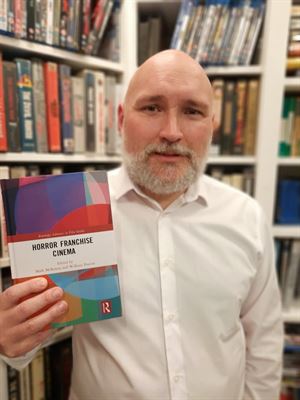Horror film franchises – fast food cinema without the calories?

A new book about the history of the horror film franchise makes its grisly debut ahead of Halloween.
Horror Franchise Cinema is co-edited by Staffordshire University’s Dr Mark McKenna alongside Dr William Proctor from Bournemouth University and features contributions from a host of established and emerging scholars in the field.
The book redresses a critical neglect toward horror franchises and examines key film series including The Texas Chainsaw Massacre and Alien. It also looks back on classic Universal Studios monster movies through to the millennial horror revival led by Blumhouse Productions with micro-budget blockbusters Paranormal Activity and The Purge.
Mark, Associate Professor of Film and Media Industries, said: “Historically within academia, the horror cinema was typically disparaged with very few critically revered films. Though this has changed in recent years, prejudices against film franchises which are generally viewed as being ‘sordidly commercial’ have meant that horror franchises have this doubly negative association.
“We wanted to recognise the enormous role that the horror genre has played in the history of film franchising over the last 80 years or so. Our book embraces these films on their own terms, acknowledging both their cultural and economic importance.”
Critics claimed the 1980s saw the “McDonaldization of horror” after A Nightmare on Elm Street director Wes Craven said that it was like making cheeseburgers – “You get a formula for something that satisfies the appetite, and then you make it over and over again and make a business out of it.”
Despite this, serialised films have been embraced by audiences worldwide and Horror Franchise Cinema highlights how long-running narratives have a special ability to engage viewers.
Mark said: “There is less resistance from the public to franchise cinema, just look at how popular the Marvel superhero films are now. It can be argued that sequels serve to enhance the series as a whole rather than just piggy backing on the success of the original.
“Fans enjoy horror series in a similar way to James Bond films – for the excitement and the thrills. They want to see what inventive and unexpected ways victims will be dispatched! So maybe it doesn’t matter if they are formulaic.
He added: “All films are worthy of analysis so perhaps it is time to stop condemning horror franchise cinema and to start, instead, to understand it. Our book fills a gap in academia, and we hope it will open up more conversations about the value of these much-maligned films.”
Horror Franchise Cinema is available to buy now
Amy Platts
Media Communications Officer
t: 01782 292702
m: 07799 341911
e: amy.platts@staffs.ac.uk
Staffordshire University is the Connected University; connected to the needs of students, academic partners, business and society. Our main city campus in Stoke-on-Trent features excellent learning and teaching facilities and good transport links. We have specialist Centres of Excellence in Healthcare Education at Stafford and Shrewsbury.
We were recognised with a Gold award in the 2019 Teaching Excellence and Student Outcomes Framework (TEF) for delivering consistently outstanding teaching, learning and outcomes for students.
We were shortlisted for University of the Year at the THE Awards 2020 and were named ‘Midlands University of the Year’ at the Midlands Business Awards 2020.
Staffordshire University has signed up to the Civic University Agreement, pledging to play a leading role in improving the regional economy and enhancing quality of life in local communities. We were recognised in the top 15 for social inclusion in The Times and Sunday Times Good University Guide 2021. We aim to be a leading university for digital technologies building on our proud computing heritage and in 2019 launched Staffordshire University London’s Digital Institute which is committed to preparing students for careers in new and emerging tech industries.
We are a Top 250 Young University (Times Higher Education Young University Rankings 2020) and are connected globally, with more than 11,000 people studying Staffordshire University degrees overseas.


